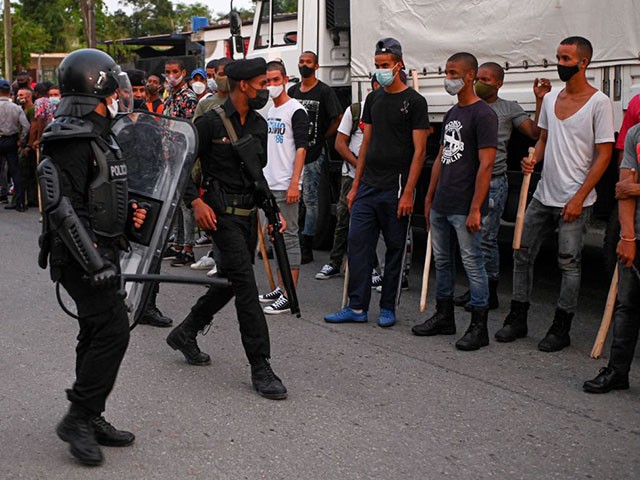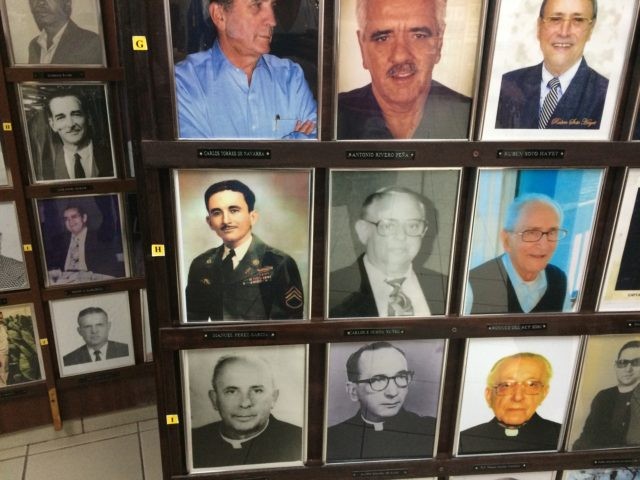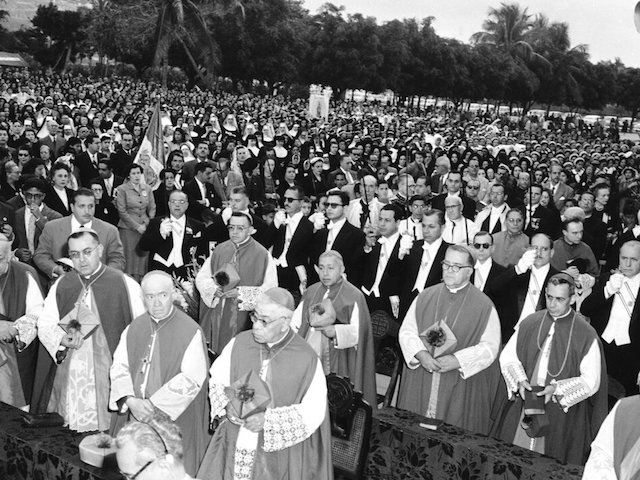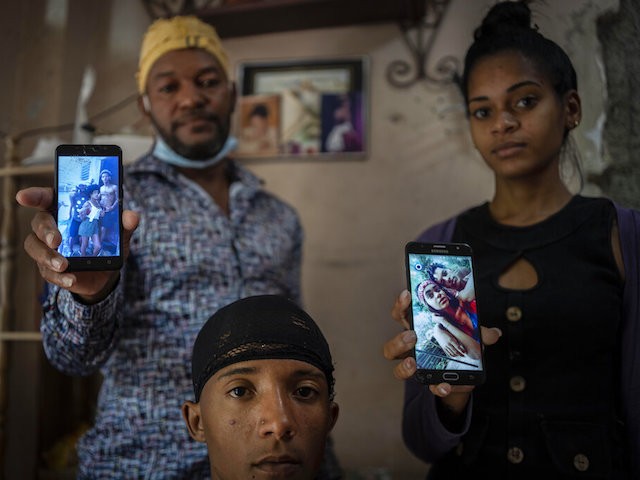EXCLUSIVE – Christian Legacy of Bay of Pigs Fighters Lives on in Today’s Cuban Protesters
Easter Sunday will mark the 61st anniversary of the Cuban and American fighters of Brigade 2506 landing at Bay of Pigs, a fitting day for an organization that emphasizes its Christian core values and bears a cross on its logo.
Brigade 2506 is the formal name of the organization that stormed Bay of Pigs on April 17, 1961, and, largely due to leftist President John F. Kennedy lying to them about providing air support, failed in that mission, subjecting them to imprisonment and torture in Fidel Castro’s Cuba. It currently exists in America as the Bay of Pigs Veterans Association and operates a museum in Miami, Florida, that passes on the history of the movement to new generations of Cuban-Americans.
The brigade’s Christian roots – its slogan is “God, Fatherland, and Liberty” – and the active participation of members of the Catholic clergy in the attempt to liberate the island particularly resonate today as the enduring Castro regime attempts to subdue a powerful protest movement intricately tied to Church leaders.
On July 11, 2021, an estimated 187,000 Cubans – though many suggest the number was far higher – took the streets of nearly every municipality in the country to demand an end to communism. Among them were many Christians, including clergymen who suffered severe beatings at the hands of Communist Party state security forces – fueling what experts tell Breitbart News is an intensified crackdown on Christianity and other key Cuban faiths, notably the Yoruba Afro-Cuban religion, as an attempt to subdue political dissidence.

Riot police walk the streets after nationwide protests against communism in Arroyo Naranjo Municipality, Havana on July 12, 2021. (YAMIL LAGE/AFP via Getty Images)
While the spotlight of American corporate media has moved on to Ukraine – a cause the Cuban exile community enthusiastically supports given Russian President Vladimir Putin’s bankrolling of the Castro regime – Cubans have not stopped protesting, often led by priests, nuns, and pastors.
Ricardo Sánchez was 19 when he served as a paratrooper in what he called in conversation with Breitbart News “our event.” He recalled Christian faith as pervasive among the members of the brigade, who relied on a team of priests for “spiritual support.”
“The slogan of the brigade is ‘God, Fatherland, and Liberty.’ That was very present. We had with us, who disembarked with us – in my case, that I was a paratrooper, who jumped with us – in Cuba several priests. One paratrooper and, if I’m remembering correctly, three or four disembarked in Girón,” he explained, referring to the beach on Bay of Pigs that hosted the invasion.
The one paratrooper has become a legendary hero of the Cuban exile community: Father Sergio Carrillo who, at 26, joined the 2506 Brigade’s paratroopers and spent two years imprisoned in Cuba for his participation. Carrillo would later recall extreme brutality on the part of his captors and especially cruel treatment to black prisoners like him.

(Photo via Bay of Pigs Veterans Association)
The priests, Sánchez explained to Breitbart News, were mostly present in the training camps prior to the invasion, “not doing military training, they were there to offer Mass and give spiritual support.” Outside of the clergy, many participants were or had been members of the Catholic Student Association of the University of Havana, including the political leader of the group, Manuel Artime.

Photos of priests alongside their fellow veterans displayed at the original Brigada 2506/Bay of Pigs Museum in Miami, Florida, May 17, 2016. (Frances Martel/Breitbart News)
Sánchez said he was not among those with the highest religious fervor upon joining the brigade, but his experience within it made him as close to a convert as someone already raised Catholic could be.
“I didn’t convert because my family raised me [in Catholicism], but [I am] someone who discovered the value of religious principles there [in Bay of Pigs] through examples of people who I saw who were Christians and Catholic,” Sánchez told Breitbart News. “I am a Catholic, my father raised me a Catholic, but in the years that I was in Cuba I was in and out of the Church, in and out of Mass, there was no depth.”
“I came to understand the value of religious principles, and the daily presence of religious principles – not just using it as a patch – I learned that there,” he said, watching fellow prisoners endure tremendous sacrifices under communist control and live their lives in an actively Christian way outside of church attendance and social engagements.
“It goes far beyond going to church, it penetrates your personal life,” Sánchez said, later adding, “I think there were many there that had that same experience.”
Prior to Fidel Castro morphing Cuba into a repressive atheist state, the island was one of the world’s most Christian countries. Legendary poet José Martí, embraced by both Cubans and the communist regime as the country’s greatest founding father, was enthusiastically Christian, though skeptical of religious institutions. The Catholic Church was a core pillar of civil society and remained so, in a distorted state, for many years under the Castro family, as multiple popes visited the island and embraced the Castros while believers languished in political prison or endured brutal assaults.

View of crowd with church dignitaries from Mexico and Cuba at coronation ceremony in Havana on Jan. 11, 1953. (AP Photo)
Fidel Castro appeared to understand very early on the contagious power of Christianity to embolden individuals to resist tyranny.
“The struggle to defend Christianity from a regime that progressively revealed itself to be militantly atheist was a major inspiration for the Cuban Resistance,” Orlando Gutiérrez-Boronat, the co-founder and spokesman for the dissident organization the Cuban Democratic Directorate (Directorio), explained to Breitbart News. “Castroite Communism knew that to build a Soviet satellite state they had to destroy the ancient spiritual traditions of the Cuban people. In many ways then, the struggle against Communism in Cuba was a spiritual one.”
“The cross and the national flag of Cuba were the glorious symbols of Brigade 2506: a Cuban Republic founded on Christian principles,” he highlighted.
Sánchez recalled to Breitbart News attending the first major event Fidel Castro organized following the collapse of the administration of former President Fulgencio Batista: a veneration of Our Lady of Charity, the matron saint of Cuba.
“The first event was an event in which they brought Our Lady of Charity to Havana, an enormous multitude showed up there. And Fidel Castro showed up to visit, to recognize, the cardinal offering that Mass,” Sánchez recalled. “Among others, I was there. I was about 18 years old, 17-18. So Fidel was very careful not to mess with the Church.”
“Later – six, seven, eight months later – after taking power and taking power decisively, he did attack zealously, he began intervening in the schools a year later, religious schools including Catholic, and he began expelling a group of priests from Cuba,” Sánchez said. “They took a lot of care because the Cuban population, whether due to history or belief, recognized itself as a religious population, majority Catholic, but that includes all types of religions.”
Today, after decades of brutal atheist repression of all religions, Christianity persists in Cuba and appears to have retaken a leadership role in anti-communist resistance.
“Religious repression in Cuba is structured and designed very meticulously. It affects all religions and control all aspects that can affect the exercise of religion,” Javier Larrondo, the president of the human rights NGO Cuban Prisoners Defenders, explained to Breitbart News in a conversation this week. The group has documented tens of thousands of arrests since the July 2021 protests and a 500-percent increase in the number of confirmed prisoners of conscience in the country in the last year, though it has consistently emphasized that the true number of political prisoners is far greater and nearly impossible to ascertain given the widespread disappearances of people in raids following the protests.

Odlanier Santiago Rodríguez, center, who was accused of participating in the recent anti-government protests and who was released after 22 days in prison, poses with his uncle Emilio Roman, left, and his daughter-in-law María Carla Milán Ramos, as they show photos of Roman’s three children who are still in prison accused of participating in the recent protests against the government, in the La Guinera neighborhood of Havana, Cuba, Wednesday, Jan. 19, 2022. (AP Photo/Ramon Espinosa)
“The repression of rights to religious liberty is exerted by a department of the Communist Party known as the Office of Religious Affairs [OAR] and, for each different creed, the regime has created parallel government organizations that try to replace the authentically religious institutions,” Larrondo detailed. “It is a way of diminishing them. Examples of this are the Islamic League of Cuba, the Council of Churches, or the Cultural Yoruba Association.”
“The repressive reality of religious people is such that 100 percent of religious people suffer diverse repressive acts,” Larrondo asserted, “from the mildest level, threats, to the impeding of religious practices as punishment, to citations, detentions, and beatings.”
While the OAR has existed for decades, human rights experts have observed a marked uptick in religious repression since last July.
“After the July 11 uprising, the systemic persecution of the Catholic Church, Christians in general, and other persons from various faith and belief traditions takes on a new dimension in Cuban society,” Jason Poblete, an international fundamental rights lawyer and president of the NGO Global Liberty Alliance, told Breitbart News. “We saw this in other nations in transitions at the end of the Cold War, such as Poland. It is not the same as the Polish Solidarity movement, but unique to Cuba and one with great potential to be a force for change in Cuban civil society.”
The Global Liberty Alliance has championed the causes of Cuban dissidents and political prisoners from all walks of society. The organization was among the first to report the disappearance of Father Castor Álvarez on July 11 for peacefully protesting. Cuban state security agents beat and dragged Álvarez through the streets of his native Camagüey before his arrest, leaving him with an overt head wound.
🚨 ALERT🚨 According to Catholic Church officials in Cuba the secret police, after a brutal beating, unlawfully detained Father Castor. He is being held in the Monte Carlos Police Station in Camagüey, #Cuba. A Bishops ignored. @USEmbCuba @USCIRF @WHAAsstSecty #ReligiousFreedom https://t.co/9DIpMplaJ1
— The Global Liberty Alliance (@GLALegalDefense) July 12, 2021
“The Communist Party of Cuba, and its Religion Police, the Office of Religious have failed to eliminate faith in God in Cuba,” Poblete told Breitbart News. “Ironically, as the persecution has intensified over the past few months, there is more unity of purpose among the many [Freedom of Religious Belief] communities in Cuba and there is no way to contain it. That is why we have been urging the U.S. government to support them in many ways, including by imposing sanctions on the Religion Police, its officials, and family members.”
The brutal beating of Father Álvarez has done little to stop Christians on the island from continuing to protest. In November, the largest protests since July took place, led in many municipalities by priests and nuns. The head of the Ladies in White organization – a group of women whose loved ones are political prisoners whose sole act of protest is attending Catholic Mass – has been arrested on a nearly weekly basis for much of the past year. Berta Soler was last arrested on Palm Sunday.
This week, Father Kenny Fernández, a vocal opponent of the communist regime, revealed the Party had blocked his attempts to obtain legal permits for a Stations of the Cross procession in Mayabeque, despite receiving such permission in the past, and was told explicitly, “my publications and actions contrary to their politics” resulted in the revocation of permission.
Negaron TODOS los permisos de Viacrucis por la calle:
El PCC me ha notificado que por mis publicaciones y acciones contrarias a sus políticas quedan prohibidos los Viacrucis por la calle en Madruga, Aguacate, Catalina y Pipián.
¿Qué les parece?
(Adjunto fotos de años atrás) pic.twitter.com/AldpxpCulb
— 🇺Kenny FD Cuba🇺 (@kennyfd1985) April 9, 2022
The repression of increasingly loud Christian dissident voices in Cuba has not put a damper on Sánchez’s optimism. The very fact that the July 11 protests occurred at all, he told Breitbart News, means something in the Communist Party has irrevocably broken.
I was very enthused by what happened on July 11 and my theory on this is that Fidel Castro’s control over Cuba started by using your neighbor, started by using your friend, started by using your family to control you,” Sánchez explained. “He created what was called los comites de defensa [the Committees for the Defense of the Revolution, neighborhood civilian espionage units] and they were constantly telling on people, accusing people.”
“However on July 11, for the first time in a long time, 50-something years, they [the regime leaders] were not aware of what was going to happen. It was totally organic. It was totally spontaneous,” Sánchez noted. “And those comites de defensa either did not see it, which I doubt it very much, or they are at a point right now where they don’t care or are a part of it.”
“I’m very, very positive based on that because we didn’t have that before. Our effort would have been completely different,” Sánchez concluded.





Comments are closed.